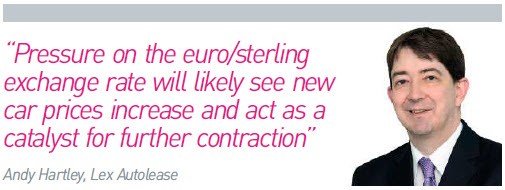Companies in the FN50 think uncertainty around Brexit and the future trading relationship will be one of the biggest challenges for the industry in the coming year.
Many organisations said uncertainty over the UK’s trading relationship with Europe after it leaves the European Union is causing businesses to put investment decisions on hold and is taking its toll on consumer confidence.
There are also concerns that continued pressure on sterling would eventually result in higher new car prices, further discouraging new car purchases.
Andy Hartley, commercial director at Lex Autolease, said: “Ongoing uncertainty surrounding the outcome of Brexit negotiations is likely to result in a deferral of investment expenditure in the corporate sector and a lack of consumer confidence in the retail sector.
“Continuing pressure on the euro/sterling exchange rate will likely see new car prices increase and act as a catalyst for a further contraction of new vehicle registrations.”
No significant impact yet
Another FN50 company stated that although there had not been a significant impact from Brexit yet, there would most likely be changes of policy and trouble for the economy in the future.
The statement read: “The added uncertainty over whether there will be a second vote on any deal and if Brexit will happen at all just adds to an already difficult situation.
“An effect on the UK car manufacturing and finance sectors would seem to be a certainty due to possible relocations and currency uncertainty.
“However, it is the indirect effect on the wider economy where we are likely to see an impact on consumer confidence and a recession cannot be ruled out.”
An executive from another company pointed out that cars built in the UK are likely to be hit with price rises from any trade tariffs. He said: “We’re hearing, of course, of the potential impact Brexit might have on the cost of imported cars, increasing by £1,500, according to some calculations.
“All cars will be affected, however, as UK-built vehicles rely heavily on imported components (about 70%). Inevitably, with such an impact on fleet costs there will be a huge amount of activity over the next two years as companies start to review their fleet policies, total cost of ownership, employee remuneration and wider business mobility issues.
“The contract hire sector has been very resilient to many changes over the past 20 years and has continually evolved to meet changing market needs and sentiment. I have no doubt it will continue to adapt.”
While the outlook was mainly negative, some FN50 companies were preparing to make the most of any opportunities that lay ahead after Brexit, once the outlook becomes clear.
Nick Hardy, sales director at Ogilvie Fleet, said: “Brexit will offer some wins and some losses I am sure – as, of course, do so many other influences in our market – but we don’t fear Brexit at all. It is simply about adapting to a changing environment.
“What we do believe is that the ‘fear factor’ around industry in general is causing a slowdown in decision-making. Therefore we are hopeful we will see a clear picture of what the real Brexit implications are as soon as possible.”
While sterling remains weak against the euro, it’s possible that could have an impact on the supply of cars, but that would not necessarily be a completely negative outcome.
Jon Lawes, managing director at Hitachi Capital Vehicle Solutions, said: “Exchange rates might adversely affect factory build slots as allocations could be reserved for other countries where margins may be higher.”
An executive from another FN50 company said: “One silver lining post-Brexit is the weaker pound may help exports and erode OEM margins that have helped stimulate tactical registration activity.
“We expect a slowing of registration growth for H2 2017, with 2018 seeing further reductions in volumes that should ultimately help support residual values (RVs) due to lower future supply of used vehicles.”

Further challenges
Contract hire companies also identified further challenges outside of the impact of Brexit that would create a more difficult environment for the fleet industry.
The recent phasing in of a new official fuel economy measuring system (the switch from the NEDC to WLTP – Worldwide harmonised Light vehicles Testing Procedure) and the forthcoming changes to measuring real world driving emissions will present a problem, according to Hartley, as there is a staggered approach to the mandatory provision of figures.
“WLTP will pose the largest challenge to the leasing sector over the short-to-medium term,” he said.
“An absence of data and inability to provide quotes taking into account wholelife cost is the immediate concern, but longer term concern exists over how the transition to new measures will impact upon vehicle taxation (benefit-in-kind – BIK– and VED) and the relative desirability of company cars.”
An executive from another FN50 company said: “While we would all encourage greater testing transparency, the current proposals around option weights and granular accounting of the effect on CO2 and mpg could cause serious disruption.
“The Low Carbon Partnership is pushing for WLTP to become the reference point for taxation from 2018 which would leave the industry with a serious headache.”
An executive from another FN50 company added: “The biggest challenge is WLTP and the ability to obtain data and apply it to back office and point of sale systems and the resultant ramifications to income tax (P11D) and business costs (Class1A NI) associated to an anticipated increase to published CO2.
“Vehicle technology is the same, but the criteria for measuring emissions has changed, and the taxpayer who has a company car will take the increased burden, but to what extent is still unknown, as new CO2 has not yet been widely published and the date where car tax switches to the WLTP data is yet to be defined.
“I suspect that if the Government see a revenue opportunity, this is likely to be in the near future.”
The WLTP issue, combined with increased new car volume in recent years could increase pressure on residual values, according to an executive from another FN50 company.
“Perhaps the biggest challenge over the next 12 months is one that has always been there and for as long as our industry has been around – resale values – managing the re-marketing of used cars returning in the next 12 months and the pricing of new models which will return in three or four years’ time,” he said.
“The combination of record new car registrations in recent years, so called ‘diesel-gate’, the wider discussions on clean air strategies, the potential impact of WLTP and the growing debate on alternative mobility solutions will all have a knock-on effect, not only on current market values but on future used car value projections.
“And while there’s a lot of hysteria in much of the press, of course, and misinformation which only fuels the debate, it is true that we’re seeing a changing attitude and the early signs of what might be a permanent shift in buying habits away from models with higher NOx emissions.
“For the time being we’re managing this change well and are confident we have priced in these factors into our RV modelling but, as ever, RVs has been a risk the industry has always taken.”
> READ MORE: the 2017 FN50 supplement



















Login to comment
Comments
No comments have been made yet.